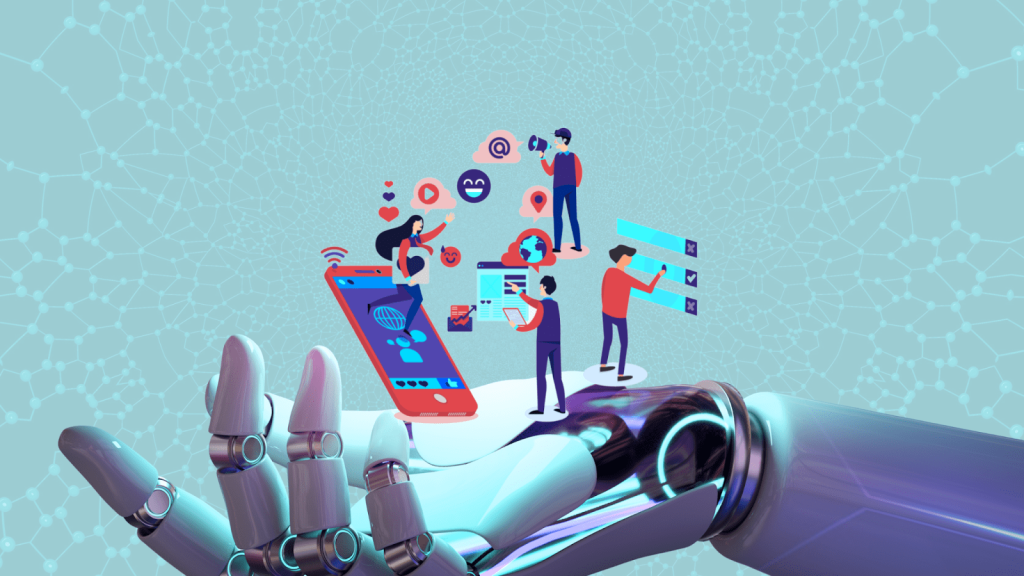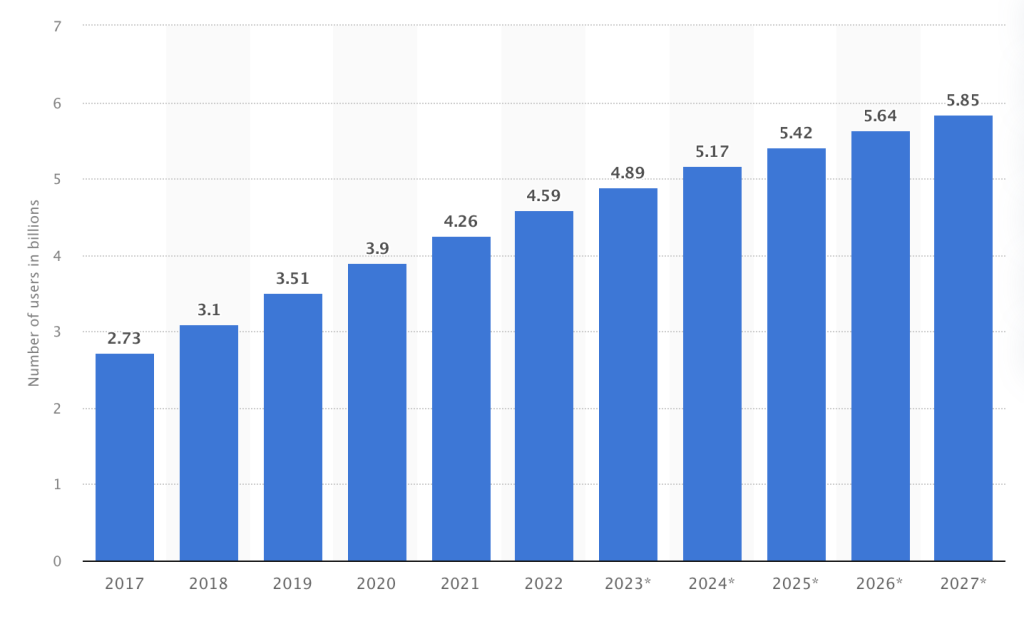We have all experienced it at one time or another, when we briefly needed to check something on our phone, opened our favorite app out of curiosity and got caught by an AI algorithm. Before you know it, you are an hour away, completely distracted from your original purpose for which you grabbed your phone in the first place. As this is a persistent problem these days, we will discuss the negative effects of AI in social media on one’s mental health in this article.
Nowadays, social media has become an integral part of our society. Young adults were the main users before, however it has spread over all age groups these days. Using social media has become an essential part of our daily life, as demonstrated by the rise in the quantity of daily users. Some smartphone apps and social media platforms are designed with regard to a certain business model. When downloading an app, one allows the exchange of personal data, which will be used in elements to prolong app usage. Most of the apps try to trick our brain’s dopamine system to nudge us towards a certain behavior. Every time we find something novel or exciting, our brain releases dopamine and tells us it is worth checking social media again. AI in social media is used for this to analyze your behavior and find content you find interesting. All those notifications and public likes and comments make us compelled to reopen the platforms. Comments and likes work like a positive reinforcement making it harder to stop using social media. Together with Fear of Missing Out (FOMO), we feel obligated to participate in social media platforms if others do.
A connection is found between the use of social media and its undesirable outcomes like anxiety, stress, depression and loneliness. Studies show that almost half of the British adults feel restless whenever they are not able to access their social networks, causing anxiety. The use of these social media platforms makes us less focused on important things and this causes stress. Stress is a root of mental health issues and can lead to depression. Research has shown that the time spent on Facebook is positively correlated with depression among high school students. Another mental health problem that is caused is loneliness, even though you might be able to connect to more people, the quality of friends matters more than the quantity of it. The users are socially isolating themselves, which causes adjustment and self-esteem. Over time, it gets harder to have emotional intelligence and empathy.
Researchers have proposed a phenomenon called ‘Facebook depression’. People who suffer from this are at risk for social depression, which is an unintended consequence of excessive social media use. It is caused by seeing status updates, posts and photos which make them feel unpopular. Nevertheless, these things might be misleading. A twitter threat proved that the more miserable you are, the happier your instagram posts are. Even for pictures, a distorted view of reality is created by all the possible filters and editing software, which can completely change your appearance.
Hereby, we must say that it is hard to make a clear distinction between social media itself, and the usage of AI within social media. Social media refers to digital platforms where one can exchange information and content with other users. The use of AI in social media, however, refers to the integration and application of AI technologies in these digital platforms, such as personalized recommendations and advertising. The undesired outcomes like anxiety and stress mentioned above are a combination between the social media usage and the AI algorithms that cause the addiction of using social media.
See the video above for a good explanation of these AI algorithms, where the negative effects are emphasized and it is hypothesized that the chances are low that we will get full insight into the algorithms used by for example Instagram or Facebook.
Furthermore, in social media, the AI algorithms can create echo chambers. The exposure to diverse perspectives is limited and it encounters only beliefs and opinions that coexist with their own. This matter is also referred to as a filter bubble and will reinforce their own ideas and ideologies, influencing policy decision making. An effect of this is polarization, which proliferates misinformation. The spread of this is caused by the algorithms, which amplify user’s information behavior by showing news, which may include fake news, which fit their opinions.
In addition, AI can also be deployed in social media as Deepfakes, which are AI-based technologies that create realistic (digital) products, such as images and videos. These products resemble reality, and thus appear to be real, but are in fact fake. In this way, misinformation can easily be spread over social media platforms, as Deepfakes are heavily related to social media through which a wide audience is reached. As products such as images and videos are important elements of communication and interaction, it is highly implicated that these can influence the audience significantly. Deepfakes can have a huge impact on self identity and a victim’s life can be devastating after being a target of Deepfakes. They can also undermine the audience’s confidence of what is perceived, heard and ultimately assumed to be true.
Positive effects of AI in social media
Despite the aforementioned drawbacks, there are also good ways of using AI in social media. For example, it can also be used to detect misinformation, such as Deepfakes, instead of spreading it by using content moderation algorithms. However, this is a hard problem to solve and despite the concerns that have been raised by the readers about publishing misleading information, there has been little attempt by the publishers to stop this. In addition, AI can be used in AI-assisted social media marketing (AISMM) to help increase the performance of businesses of small and medium enterprises. This way, companies can reach their targets more easily and retrieve more clients of interest. But by doing so, there exists a possibility of diminishing the domain of possible companies the target will see, and thus influencing the target in a negative way.
Social media can also be used for self-expression and especially by using AI this can be done in a new creative way. However, this can also lead to insecurities since, most of the time, only the most beautiful images are shown.
Furthermore, AI can be deployed as digital humans to combat loneliness. These AI companions can be used in social media like Facebook, where users can have open-ended conversations with these systems about various topics. However, we strongly believe that, as loneliness is caused by social isolation, an excessive use of these digital humans causes the users to get even more socially distanced from the rest of the world by lack of interaction with real people.
In conclusion, even though AI used in social media can be helpful for example for detecting misinformation or mental health problems and help companies reach their targets more easily, we think these benefits do not outweigh the negative effects of using AI in social media. We strongly believe that before extending the usage of AI in social media, more specific regulations need to be made to what extensions AI may be deployed in social media.




